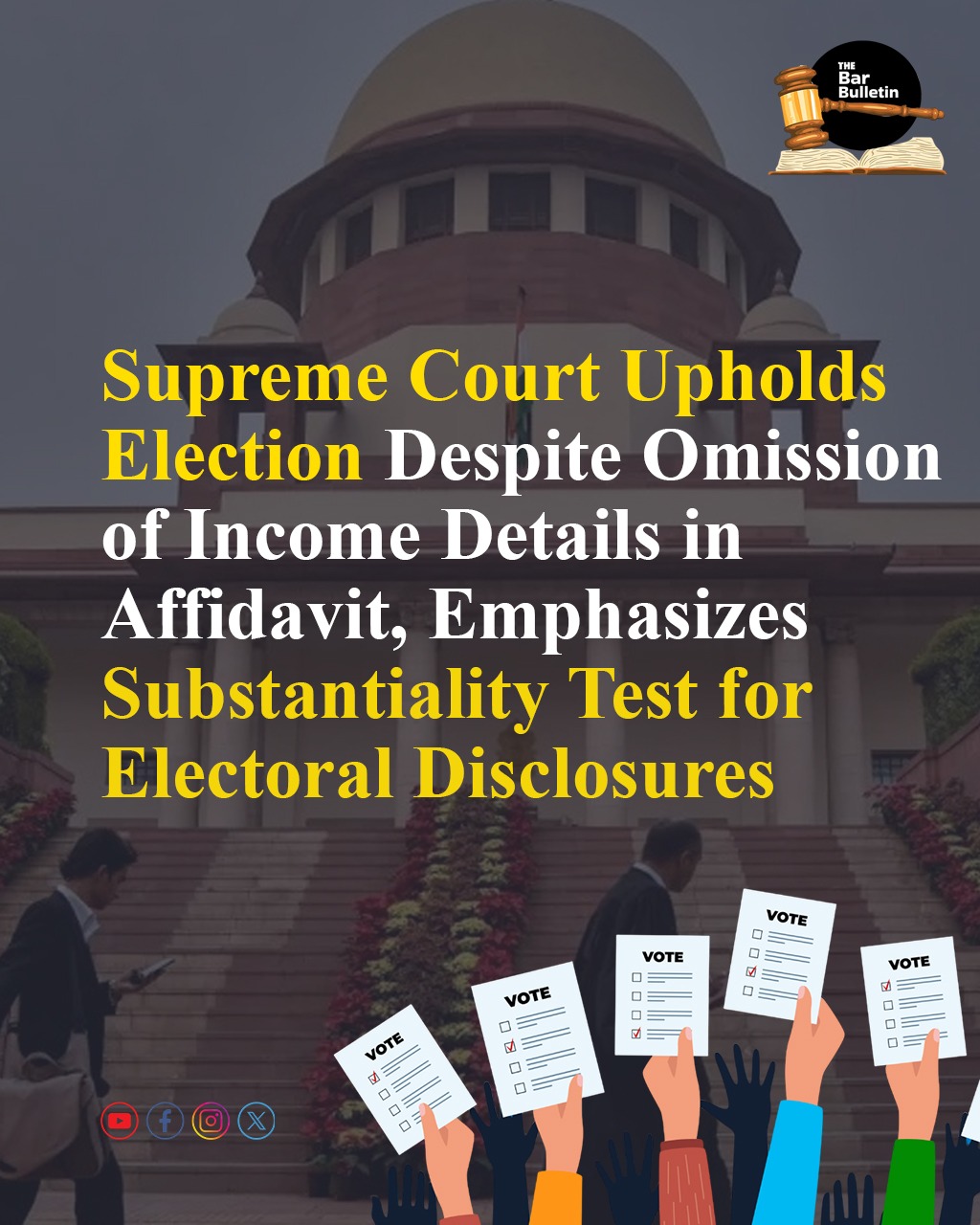The Supreme Court dismissed an appeal in a case addressing non-disclosure of income details in an electoral affidavit, reinforcing the principle that only substantial omissions or misrepresentations can vitiate a returned candidate’s election result.
The appeal, filed under Section 116A of the Representation of the People Act, 1951, arose from the dismissal of an election petition before the Telangana High Court. The appellant had contested the 2023 Telangana Legislative Assembly elections, ultimately losing to the respondent by a margin of 22,798 votes. The central contention was that the respondent, in her Form 26 Affidavit accompanying her nomination, entered “NIL” as income for four out of the last five financial years, despite allegedly earning a monthly honorarium as Zilla Parishad Chairperson and being eligible for ex-MLA pension.
The appellant contended that this omission amounted to concealment of material information and therefore constituted a corrupt practice. It was argued that such non-disclosure rendered the nomination’s acceptance improper under the Representation of the People Act, 1951 and justifies voiding the respondent’s election.
The respondent, in her defence, did not dispute the “NIL” entry but maintained that she had disclosed all relevant assets, sources of income, profession, and her PAN details. She furnished a certificate showing non-drawal of pension during the relevant period and pointed out that her nomination as Chairperson with the associated honorarium was declared in the affidavit. It was also highlighted that no objections were raised during nomination scrutiny by the Returning Officer, and that such technical lapses had no actual relevance to the integrity of the electoral process or the voters’ choice.
The Supreme Court Bench comprising Justice Surya Kant and Justice N. Kotiswar Singh recalled the constitutional foundation for transparency and the right to information in the electoral process, while distinguishing between the strict statutory requirements for disclosure of criminal antecedents and the broader but judicially evolved norms for asset and income disclosures. The bench emphasized that mere omission to furnish all income tax return details, when assets and sources of income are otherwise disclosed and not genuinely disputed, cannot in itself be termed a material defect or corrupt practice.
Key to the Court’s reasoning was the “substantiality” test. It held that not every omission or failure in the affidavit is fatal; only those that are of a substantive nature, likely to mislead voters or conceal major financial information, warrant judicial interference in the election result. The Court observed that the respondent had not left columns blank, nor engaged in deliberate or false misrepresentation. No evidence of unaccounted or concealed wealth was advanced. The non-disclosure was found to be technical, procedural, and inconsequential.
The Court further underscored the sanctity of the electoral mandate, cautioning against disturbing the will of the people on the basis of minor or technical lapses, unless such lapses could be shown to have materially affected the election result. In this case, the margin of victory was substantial and no such material impact was demonstrated by the appellant.
Accordingly, the Supreme Court held that the non-disclosure of income for the specified years was not of a substantial character and did not warrant setting aside the election. No corrupt practice or substantive legal non-compliance was established. The appeal was dismissed as devoid of merit and the respondent’s election was upheld.
Cases relied on:
1. Association for Democratic Reforms vs Union of India and Anr., (2001) 57 DRJ 82 (DB)
2. Union of India vs Association for Democratic Reforms and Anr., (2002) 5 SCC 294
3. People’s Union for Civil Liberties (PUCL) and Anr. vs Union of India, (2003) 4 SCC 399
4. Resurgence India vs Election Commission of India, (2014) 14 SCC 189
5. Jagan Nath vs Jaswant Singh, (1954) 1 SCC 57
6. Madhukar G.E. Pankakar vs Jaswant Chobbildas Rajani and Ors., (1977) 1 SCC 70
7. Santosh Yadav vs Narender Singh, (2002) 1 SCC 160
8. Jeet Mohinder Singh vs Harminder Singh Jassi, (1999) 9 SCC 386
9. Lok Prahari vs Union of India and Ors. (2018) 4 SCC 699
10. Rukmini Madegowda vs State Election Commission and Ors. (2022) 18 SCC 1
11. Karikho Kri vs Nuney Tayang and Anr., 2024 SCC Online SC 519



